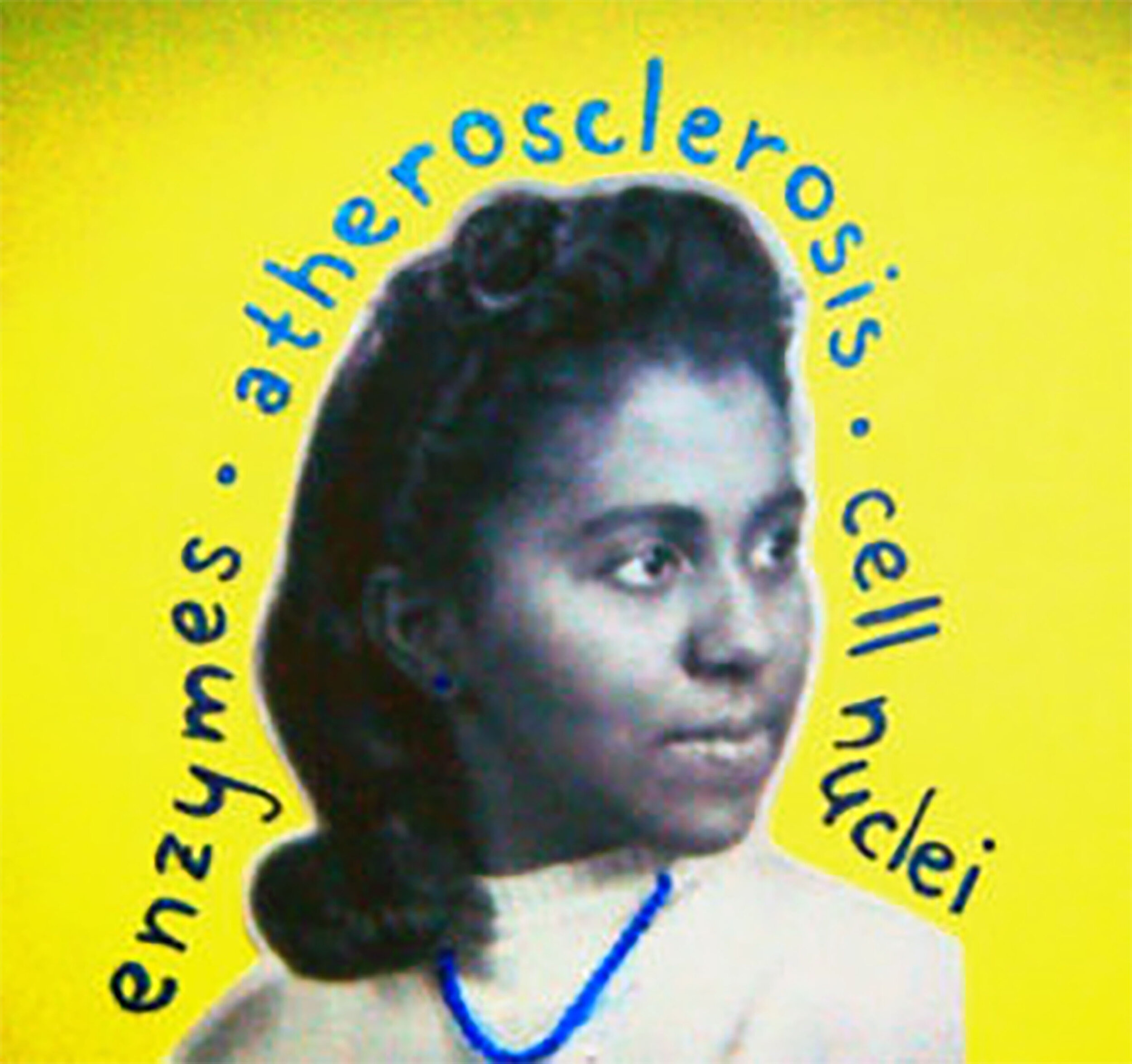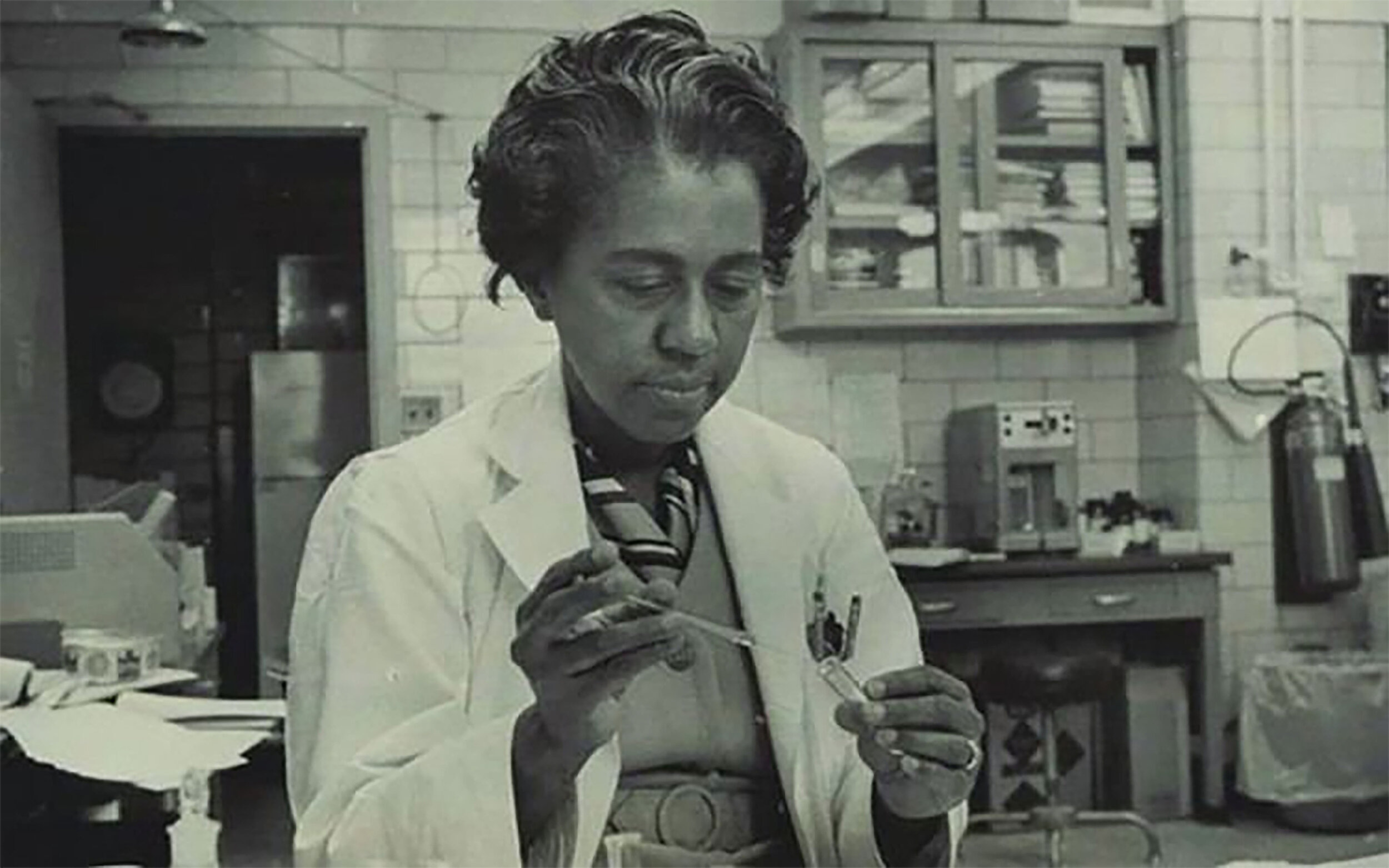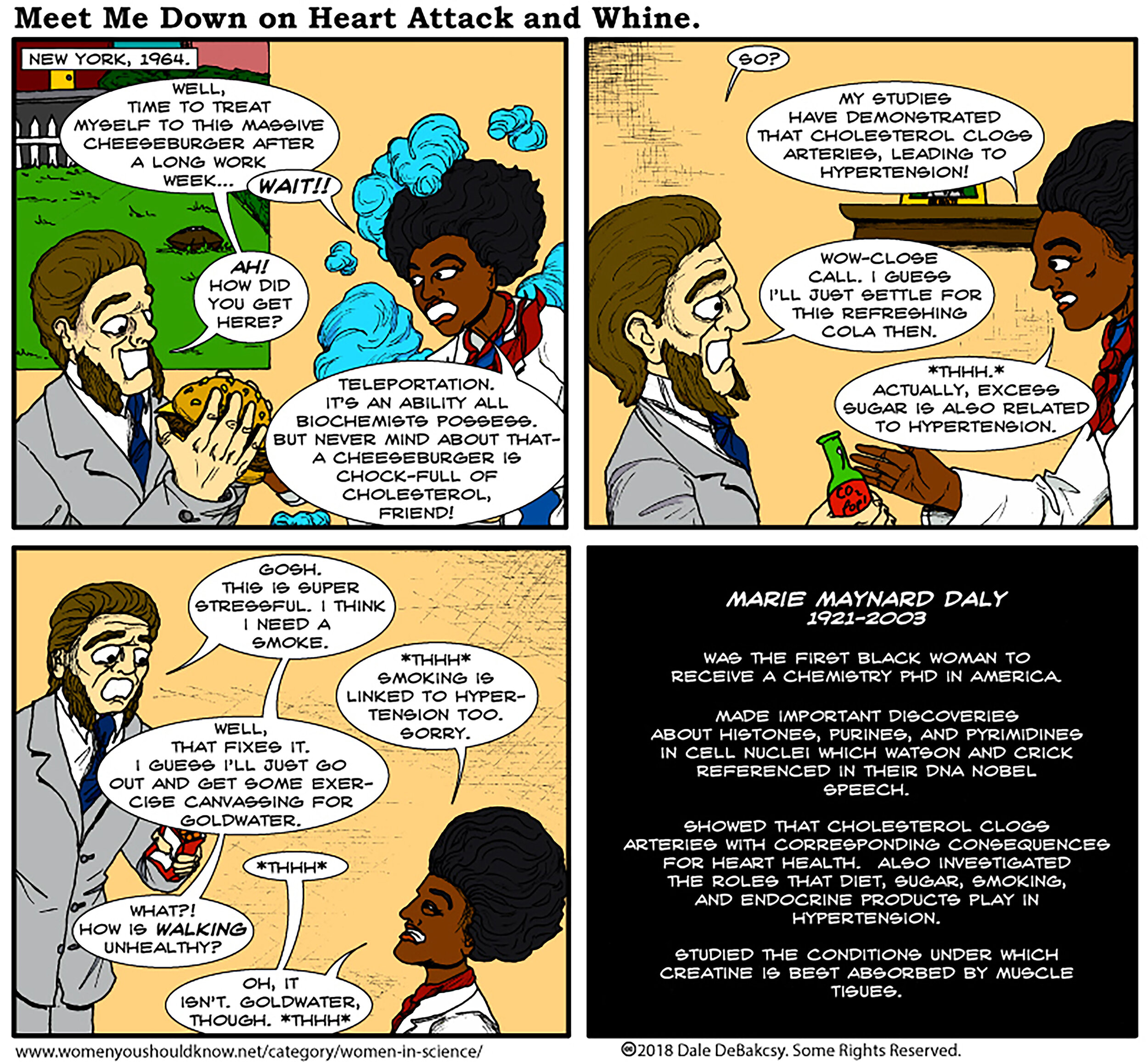Courage is like a habitus, a habit, a virtue: you get it by courageous acts. It’s like you learn to swim by swimming. You learn courage by encouraging.
– Marie Maynard Daly
 Photo Credit: STEMtrix
Photo Credit: STEMtrix
Marie Maynard Daly was not only the first black person to receive a Ph.D. in Chemistry, but she also made scientific contributions to the study of cardiovascular disease.
Overcoming Hurdles of racial and gender bias Marie Maynard Daly is the first black woman to receive a Ph.D. in Chemistry in the United States. Daly made significant contributions to research: the chemistry of histones, protein synthesis, the relationships between cholesterol and hypertension, and creatine uptake by muscle cells. In addition to her historical research, she was committed to developing programs to increase the enrollment of minority students in medical school and graduate science programs.
Interest in Science
In 1921, Daly was born in the Corona neighborhood of Queens, New York. Her father, Ivan C. Daly, emigrated from the West Indies as a young man and her mother, Helen Page, from Washington D.C. Before Marie was born, her father attended Cornell University to study Chemistry. Unfortunately, he had been forced by economic circumstances to drop out of school. Her mother came from a family of readers, and she spent long hours reading to her daughter about science and scientist. Daly became an avid reader like her mother. Her father’s love of science inspired her. She was captivated by Paul De Kruif’s famous bookÂ, The Microbe Hunters, which partially influenced her decision to become a scientist.
Education
Daly attended Hunter College High School, an all-female institution, where they supported her ambition to become a chemist. After graduating high school, Marie stayed at home with her parents to save money for college, where she later attended Queens College, New York, where she majored in chemistry. She graduated magna cum laude from Queens College with her bachelor’s degree in chemistry in 1942. She was named a Queens College Scholar, an honor to the top 2.5% of the graduating class. That college offered her work right away as a part-time lab assistant. A separate fellowship allowed her to study for her Master’s at New York University, which she obtained in 1943. Daly worked for a year tutoring chemistry students at Queens College
Daly wanted to return to school for her Ph.D., but the programs were costly. She received a fellowship to work at Dr. Mary Caldwell’s lab at Columbia University. Caldwell (1890-1972) received her Ph.D. at Columbia in 1921 and went on to become its first woman chemistry professor—Caldwell, is known for her research that made her a world authority on the digestive enzyme amylase. Daly worked at the lab to save money for her Ph.D., but that’s when World War II’s demand for new scientists intervened. With the help of Caldwell, Daly obtained funding from the university to help in her full-time chemistry study. Caldwell was pivotal in supporting and mentoring a woman of color to succeed in STEM.
For two years, Daly taught at Howard University in Washington, DC. However, she received a grant from the American Cancer Society to support her postdoctoral research, joining Alfred E. Mirsky, a pioneer in molecular biology, at the Rockefeller Institute in New York. At Rockefeller, she studied cell nuclei and their contents. Before Watson, Crick, and Franklin had discovered DNA structure in 1953, and Hershey and Chase confirmed its role as the carrier of genetic information in 1952.
In 1960, she became an assistant professor at the Albert Einstein College of Medicine at Yeshiva University. In 1971, Daly was promoted to associate professor of Biochemistry. There she published journals in Circulation Research, Lipid Research, and the American Journal of Physiology.
 Photo Credit: Ebony Magazine online
Photo Credit: Ebony Magazine online
Research
Daly researched how compounds produced in the body affect and participate in indigestion. Her dissertation was titled “A Study of the Products Formed by the Action of Pancreatic Amylase on Corn Starch.” She received her doctoral degree in 1947, only three years after enrolling in the program.
PROCEEDINGS OF THE FIFTY-FOURTH ANNUAL MEETING OF THE AMERICAN SOCIETY FOR CLINICAL INVESTIGATION, INC., HELD IN ATLANTIC CITY, N. J., APRIL 30, 1962
A study of the products formed by the action of pancreatic amylase on corn starch.
SYNTHESIS OF PROTEIN IN THE PANCREAS
She worked on the composition and metabolism of components of the cell nucleus, among other studies, for seven years. Then Daly took a new position teaching biochemistry at the College of Physicians and Surgeons of Columbia University. In 1960 she became a professor at the Albert Einstein College of Medicine. During her time there, she worked in the research laboratory of Dr. Quentin B. Deming. Her research efforts focused on the crucial relationship between cholesterol and heart attacks. Daly and Deming published three peer-reviewed papers during their research collaboration in the Journal of Experimental Medicine, the Journal of Clinical Investigation, and the Journal of Laboratory and Clinical Medicine.
She also studied the effects of sugar on arteries and cigarette smoking on lung tissue. Daly established a scholarship fund for black students studying physics or chemistry at Queens College in 1988. Upon her retirement Daly and her husband, Vincent Clark, whom she married in 1961.
Marie Maynard Daly Clark died on October 28, 2003. In 2016, the Founding Principal of the new elementary school P.S.360Q, Mr. R. Emmanuel-Cooke, announced that the school would be named “The Dr. Marie M. Daly Academy of Excellence” in honor of the Queens resident.
Memberships: American Chemical Society; American Society of Biological Chemists; American Heart Association; Harvéy Society; National Association for the Advancement of Colored People; National Association of Negro Business and Professional Women; New York Academy of Sciences Board of Governors.
Awards:Â Phi Beta Kappa; Sigma Xi; Queens College Scholar; fellow, American Association for the Advancement of Science; American Heart Association.
MARIE MAYNARD DALY- African American Scientist Timeline created by Jillian F. In History
Why is Marie Maynard Daly important?
-
Making medicine to help the effects of smoking
-
Making medicine for heart attacks
-
Making medicine to help the breakdown of the circulatory system
-
It gave Black women the courage to do what they want
-
First female Black person to earn a pH.d. in chemistry in the united states


